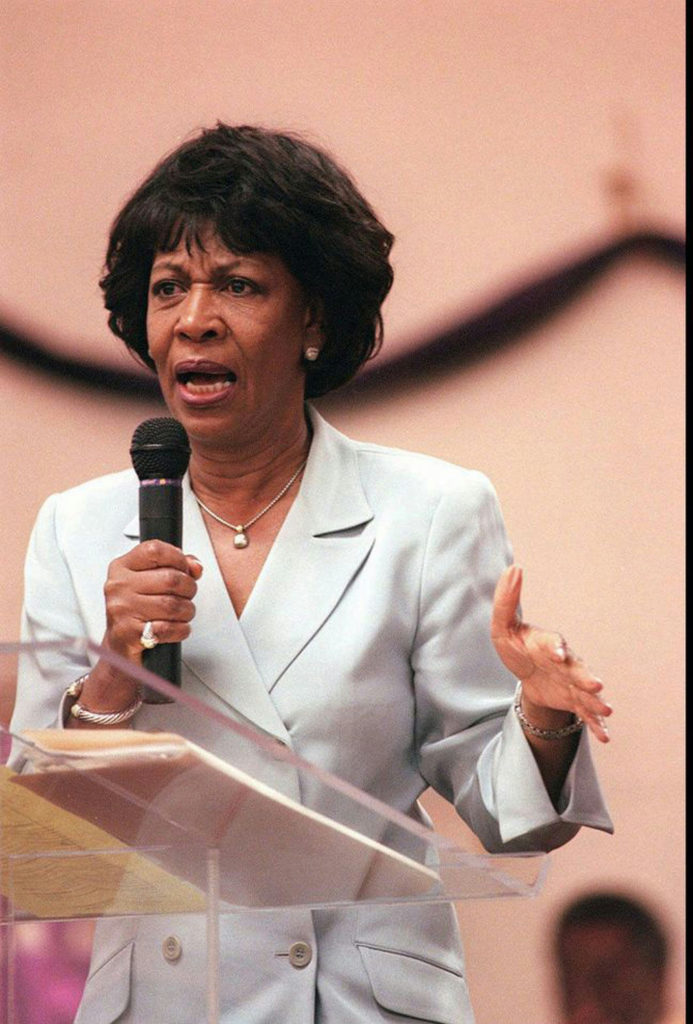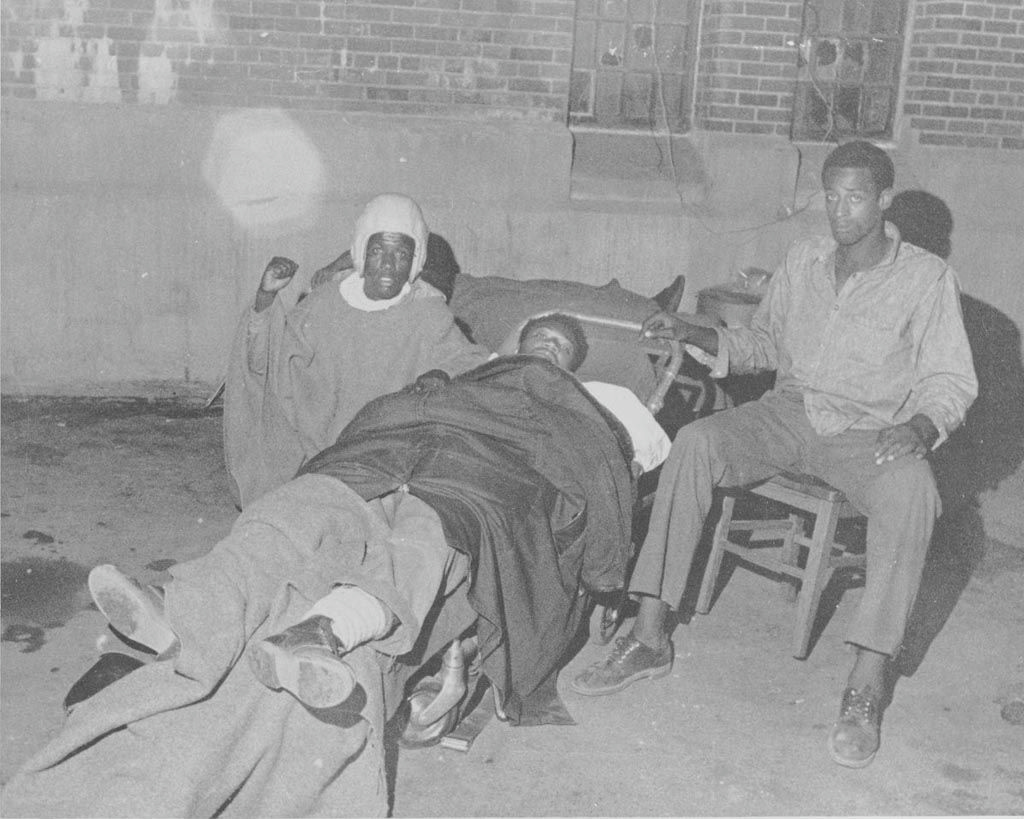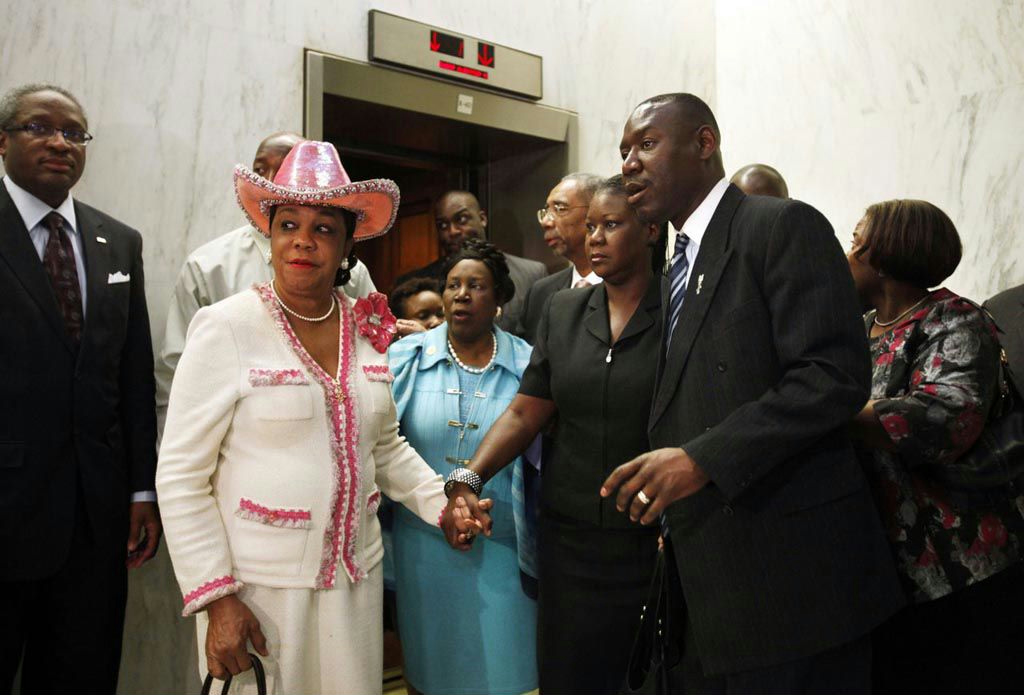Criminal Justice: History
Discover the history of CBC activism on criminal justice issues including police brutality, drug trafficking, sentencing and prison reform.

Rep. Maxine Waters Speaks about Police Brutality (1999)
Rep. Maxine Waters speaks on the subject Police Brutality, A Nation Epidemic, at the Riverside Faith Temple, Sunday, June 20, 1999, in Riverside, California. Waters came to Riverside to lend her support and voice into the investigation of police brutality in the wake of the Tyisha Miller shooting death by Riverside policemen on December 28, 1999.
Since its inception, the Congressional Black Caucus (CBC) has served as a necessary catalyst for criminal justice reform in the United States. Amidst moments of turmoil and civil unrest, the CBC emerged to restore hope to the Black community while demanding a more just criminal justice system for all.
Years before the CBC’s official formation, Black members of Congress vocalized their keen support of or opposition to some of the country’s most significant pieces of criminal justice legislation. In 1963, at the height of the Civil Rights Movement, the Committee on the District of Columbia released a report outlining the significant increase of crime in the District. Shortly thereafter, the DC Anti-Crime Bill was introduced to “ameliorat[e] crime conditions and mak[e] the streets safe” for D.C.’s citizens, government workers, and visitors. Black members of Congress were not normally outspoken when it came to most local and state matters, but this bill, according to Rep. John Conyers (D-MI), had significant national implications. The bill in its initial form called for, among other things, the enforcement of more stringent policies including mandatory minimums for crimes committed within the District. It would also have given more authority to police within the local jurisdiction. Rep. Conyers feared that such policies could be especially harmful to the Black community of D.C. Between 1963 and 1967, he cautioned legislators to be “particularly careful and responsible about authorizing police procedures in local jurisdictions for which we have special responsibility—the District of Columbia.” If this legislation were adopted, he believed “it would undoubtedly serve as a precedent and pattern for the enactment of similar legislation by State and municipal legislative bodies.” So, when the Law Enforcement and Criminal Justice Assistance Act, also known as the Omnibus Crime Bill, was introduced in both 1967 and 1968 with similar directives, Rep. Conyers voted against the bills.
If the focus in the late 1960s could be summed up through crime legislation, the early 1970s signaled a focus on prison reform in the criminal justice system. On September 9, 1971, partly in response to the killing of a Black prisoner at the San Quentin prison in California, inmates of the Attica Correctional Facility in New York took control of half the prison, taking 38 prison guards hostage. They demanded better treatment, declaring, “We are men. We are not beasts and we do not intend to be beaten and driven as such.” By the end of the four-day showdown, 39 people were dead, including correctional officers, civil employees, and prisoners. After the Attica riot sparked a series of prison riots around the county, the CBC was moved to act. Between 1971 and 1975, they introduced and collectively supported numerous pieces of legislation to establish minimum standards of treatment for prisoners, improve correctional facilities, and increase appropriations to these facilities. CBC members Reps. Augustus Hawkins (D-CA), John Conyers (D-MI), Ronald Dellums (D-CA), William L. Clay Sr. (D-MO), Shirley Chisholm (D-NY), Ralph Metcalfe (D-IL), Parren Mitchell (D-MD), and Charles Rangel (D-NY) supported some, if not all, of these pieces of legislation. Of these members, Reps. Dellums and Rangel were especially vocal. Rep. Dellums focused much of his legislative agenda during the 1970s on prison reform, introducing bills against prisoner mistreatment and publicly advocating for reforms through remarks and written articles, including a piece for the San Francisco Post titled, “Behind the Prison Walls.” In addition to supporting legislation, Rep. Rangel also offered formal remarks on the House floor and participated in television interviews focused on prison reform.
Prison reform was not the only major criminal justice issue for the CBC during the 1970s and 1980s. Government-led efforts to reduce illegal drug use also commanded Caucus attention. In 1971, the same year as the Attica Prison Riot, President Richard Nixon declared a “War on Drugs” and began a campaign to reduce the illegal drug trade through dramatically increasing penalties and prison sentences for both drug dealers and users. In the decade that followed, additional policies and campaigns emerged, including the Anti-Drug Abuse Acts of 1986 and 1988, signed into law by President Ronald Reagan, and First Lady Nancy Reagan’s “Just Say No” campaign during her husband’s presidency. On its face, these were policies intended to reduce illegal drug trade and use, but members of the CBC also realized the policies’ potential to disproportionately criminalize people of color. Rep. George Crockett Jr. (D-MI) was especially vocal on this issue, and according to several newspapers, was noted as the first member of Congress to advocate for the decriminalization of drugs. Rep. Rangel, who at the time was chair of the Select Committee on Narcotics, also participated in discussions on drug policy reform. CBC members introduced and supported legislation that prohibited assistance to foreign countries that failed to act to prevent entry of drugs into the United States. As the heroin and crack epidemic grew in urban communities across the country, more CBC members introduced legislation that sought the development of programs and research to address rapidly increasing rates of narcotic addiction.
The harsh sentencing laws at the height of the War on Drugs led to a dramatic increase in the United States prison population. African Americans were disproportionately affected by the war’s punitive policies, especially the disparity in sentencing between convictions for crack and powder cocaine. Black members of Congress sought to address this disparity and enact other sentencing reforms. Rep. Rangel was a leader in this effort during the late 1980s and early 1990s and introduced several pieces of legislation including the Crack-Cocaine Equitable Sentencing Act. Sentencing reform continued as a central issue for the Caucus and remains so today. CBC members including Reps. Robert C. “Bobby” Scott (D-VA), James Clyburn (D-SC), Maxine Waters (D-CA), and Sheila Jackson-Lee (D-TX) have either introduced or ardently supported sentencing reform legislation. Rep. Scott introduced the Fair Sentencing Act of 2010 and its passage into law reduced the sentencing disparity between federal convictions for crack cocaine and powder cocaine from a ratio of 100:1 to 18:1. In the years following, Reps. Hakeem Jeffries (D-NY) and Karen Bass (D-CA) and Sen. Cory Booker (D-NJ) introduced several pieces of legislation to eliminate the remaining disparity, address outdated sentencing laws, and make sentencing changes retroactive so those previously convicted can request resentencing.
Addressing police brutality is another central aspect of CBC justice efforts. The brutal beating of Rodney King on March 3, 1991 incensed Black people across the country, including members of the CBC. A videotape captured King, a black motorist, being beaten by at least four non-Black police officers after a car chase. Rep. Conyers referred to the incident as “a modern-day lynching” due to the severity of the beating, which seemed to have been motivated largely by the fact that King was Black. In the years immediately following, members of the CBC mobilized through the creation of the Task Force on Police Brutality and Misconduct, holding hearings across the country. Their legislative efforts to address the issue, however, remained unsuccessful.
The August 2014 death of Michael Brown, an 18-year-old Black man, at the hands of a police officer, sparked a renewed intensity to address law enforcement reform through legislation. Since then, the CBC’s call for police reform has gained even more urgency in response to the highly-publicized deaths of more than a dozen unarmed Black Americans killed by law enforcement officers. CBC members, including Sen. Cory Booker (D-NJ) and Reps. Hakeem Jeffries (D-NY) and Gwen Moore (D-WI) and have introduced a variety of bills to limit the use of excessive force. Other CBC members introduced legislation in the 116th, 117th, and 118th Congresses that would have imposed limitations on the transfer of excess military equipment to state and local law enforcement agencies, funded body cameras for police officers, and prohibited the use of chokeholds or other restraint techniques. CBC members introduced and supported several more wide-ranging reform bills including the George Floyd Justice in Policing Act of 2020 and the Jobs and Justice Act of 2020 to address excessive and lethal use of force by police alongside other reforms.
In recent years, CBC members have introduced legislation to eliminate the federal death penalty, decriminalize marijuana, limit the collateral consequences of incarceration on individuals after their release, create a registry to track police misconduct, and provide for many other reforms. The CBC is a crucial voice addressing inequalities in the criminal justice system on a variety of issues.


